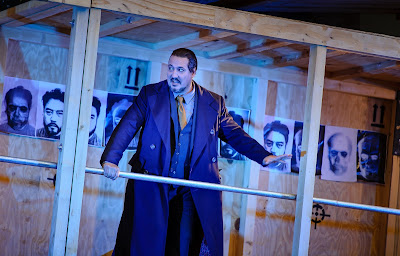 |
| Antonio Yang, Inga-Britt Andersson - Wagner: Der fliegende Höllander Heidenheim Opera Festival (photo Oliver Vogel) |
Reviewed by Robert Hugill on Jul 26 2017
Star rating:
Clear and direct modern-dress production illuminated by a remarkable account of the title role
 |
| Antonio Yang, Inga-Britt Andersson (photo Oliver Vogel) |
We caught the performance of a new production of Wagner's Der fliegende Holländer on Wednesday 26 July 2017. This was supposed to be out of doors in the castle, but bad weather forced the transfer of the production to the theatre, something which happened perfectly seamlessly (tickets have both indoor and outdoor seat numbers). The theatre is a modern multi-function space in the congress centre, and rather reminded us of Saffron Hall in the way it combined a basic theatre with multi-function uses, in an admirably lively and not unflattering acoustic.
Marcus Bosch conducted the Stuttgart Philharmonic Orchestra (resident at the festival). The production was directed by Georg Schmiedleitner (director of the production of Wagner's Ring Cycle at Nuremberg State Opera in 2013-2015), with sets by Stefan Brandtmayr, costumes by Cornelia Kraske, and lighting by Hartmut Litzinger. Randall Jakobsh was Daland, Inga-Britt Andersson was Senta, Vincent Wolfsteiner was Erik, Melanie Forgeron was Mary, Martin Platz was the steersman and Antonio Yang was the Dutchman, with the Czech Philharmonic Choir Brno providing the chorus.
Being designed for out-door performance, the production was scenically straight-forward with black plastic sheeting for Act One and, following an interval, plywood staging for Acts Two and Three. Georg Schmiedleitner's production made imaginative use of the auditorium, with Antonio Yang's Dutchman and his henchmen performing most of Act One in the auditorium, thus keeping a nice division from Daland (Randall Jakobsh) and his crew on-stage.
 |
| Wagner: Der fliegende Höllander on Heidenheim Opera Festival's out-door stage (photo Oliver Vogel) |
 |
| Randall Jakobsh - (photo Oliver Vogel) |
Antonio Yang made a strikingly non-traditional Dutchman; young, muscular (wearing a vest under his leather coat) with tattoos. He sang with a darkly burnished, grainy tone, capturing the character's introspection and wariness, whilst never relapsing into lassitude. He brought a remarkable quality of stillness to the role, rendering it positive, expressive and very present, rather than simply as absence. This was most noticeable in the Act Two duet with Senta, when the Dutchman seemed to take a long time, watching intently, before committing. It was a very human performance, without the sense of the mythic, but in the final scenes a great weariness of a man betrayed many times before.
Inga-Britt Andersson is a dramatic soprano who has made the transition to Wagner roles in the last few years and already sings Brünnhilde. She made Senta a self-obsessed loner, and brought a youthful naivety and brightness of vocal tone to the role. In Senta's ballad, Andersson sang much of it quite quietly, creating some beautifully radiant tone. In the more dramatic passages, when the voice was more under pressure, it tended however to hardness. But overall this was a remarkable performance. In the closing scenes of Act Two she and Antonio Yang developed a strong and vivid bond, even when little was happening physically.
 |
| Vincent Wolfsteiner, Inga-Britt Andersson (photo Oliver Vogel) |
Randall Jakobsh created a remarkably sinister figure as Dalan, this was no simple money loving seaman, and there seemed a streak of cruelty in the character. This wasn't just the extra invented action (hints of incest and physical abuse), but Jakobsh's own strong persona really created a threatening effect. He sang vividly and I could have imagined him in the title role.
Melanie Forgeron made a striking Mary, though her vibrato was too strong for my taste. Martin Platz gave a poignant account of his solo, singing with robust yet lyrical tone. In the opening to Act Three he bravely stripped down to his underpants. You felt that this was a device of the director and choreographer to distract us from the dramatic limitations of the chorus.
The Czech Philharmonic Choir Brno sang superbly and the men's contribution to Act One was some of the best I have heard, with lithe yet powerful tone and incisive words. The women were equally fine in the ballad in Act Two, and musically the chorus impressed throughout so you forgave them any dramatic limitations, and they certainly did more than just stand and sing.
 |
| Martin Platz, Czech Philharmonic Choir Brno - Wagner: Der fliegende Höllander Heidenheim Opera Festival (photo Oliver Vogel) |
This was not the most philosophically deep production of the opera, but the performance had an admirable all-encompassing quality, really surrounding the audience. Though in modern dress, Georg Schmiedleitner's production was admirably clear and direct, with a remarkably performance from Antonio Yang in the title role.
Elsewhere on this blog:
- Mind Music: Northern Chamber Orchestra & Stephen Barlow supporting Parkinson's UK - CD review
- Spirituality: Plainchant Requiem Mass sung by The Fraternity - CD review
- A disc which makes me want to hear them live: The Alehouse Sessions from Barokksolistene - CD review
- The art of saying no: My interview with soprano Albina Shagimuratova - interview
- Neglected drama: Andre Tchaikowsky's The Merchant of Venice - Opera review
- Over There! London English Song Festival evoke the American entry into World War One - concert review
- Captivating: Leoncavallo's Zaza - Opera review
- Choir and brass: Lassus Requiem a 5 from Girton College and Guildhall School - CD review
- Strong ensemble, intense drama: Janacek's Kat'a Kabanova at Opera Holland Park - Opera review
- Armenian remembrance: Tigran Mansurian's Requiem on ECM Records - CD review
- Exploring her lyrical side: I chat to soprano Natalya Romaniw - interview
- Stravaganza d'amore Raphael Pichon & Pygmalion in early Florentine Intermedi and opera - CD review
- Home



.jpg)






%20Craig%20Fuller.jpg)
No comments:
Post a Comment